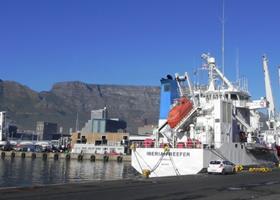
The arrival of the first conventional shipment of South African citrus to the Port of Philadelphia marks the start of a season which, by all accounts, will see total South African exports climb on the previous year.
The Iberian Reefer, which discharged in Phildalphia this week, carried some 2,600 pallets of Clementines and Navels and arrived in time for fruit to be delivered to waiting customers in the run-up to the peak shopping period as US citizens get ready for the 4 of July celebrations.
During the next nine days, two more conventional vessels will arrive in the US while the fourth vessel, the Amazonas, is expected to depart from Cape Town this weekend. Once the Amazonas sails, the total shipments from South Africa this season will be well ahead of last year’s volume at the same point. If this trend continues for the rest of the campaign total shipments will be between 15-17 per cent higher than last season.
'We expect to see continued growth in our exports to meet the increasing US demand for our excellent quality citrus products,' said Suhanra Conradie, CEO of the Western Cape Citrus Producers Forum (WCCPF) 'Clementines comprise the larger percentage of early season shipments, followed by Navel Cara Cara, and Midknight oranges. A small quantity of Star Ruby grapefruit will be shipped to the US.'
The WCCPF said in a statement that there is a very large volume of citrus on the trees in South Africa and weather and growing conditions have been ideal so far to produce fruit with high brix and sweetness levels. Due to cool weather the external colour of the fruit is also said to be very good.
Prior to the arrival of the Iberian Reefer, exporters used container shipments to land some 1,600 pallets in the US in order to supply their customers during the early part of the season. However, once the conventional programme gets under way, container shipments usually decline.
So far this season South African exporters have not had it all their way. A strike in the port delayed loading of the first vessel, as well as temporarily halting the accumulation of fruit for the second vessel. This, coupled with delays in harvesting due to rain, meant that they have not been able to land as much fruit in the market prior to the upcoming holiday period.
The WCCPF says it has taken into account the keeness of US consumers to be supplied with safe and healthy food, and that South African citrus is inspected multiple times – at the packhouses in South Africa, again at the port of Cape Town prior to loading onto the vessel, and again on arrival in the US. 'Because our fruit is maintained at cold temperatures close to -0.55°C or 33°F during shipment, it does not require chemical fumigation on arrival, as does citrus from other Southern Hemisphere countries,' Conradie explains.
The WCCPF notes that marketing initiatives for South African citrus are increasing. There will be an increase in in-store promotions this season and this will be supported by grower visits and information packs with new recipes. The WCCPF will again support youth soccer and will for the first time hand out a Summer Citrus Soccer Star Award.



